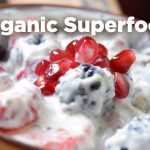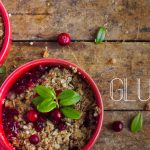Cooking With Fresh, Local, and Organic Ingredients
Nature already has nutrition figured out. So when eating food, I like to trust nature over chemists. Simply put over-processing your foods greatly reduces the nutrients available to you, therefore I strive to eat raw food 70% of the time. While I love to eat a delicious hot meal, I always pair it with something raw, such as a salad or a side of fresh veggies, and many times my entire meal is raw.
Processing and heating your food can do the following:
- Depletes and alters nutrients
- Decreases fiber
- Destroys food enzymes needed for digestion
- It creates toxic substances and byproducts. A good rule of thumb is the higher the heat, the lower the nutrition.
- Interferes with digestion and taxes your organs with unnecessary work
- Lower in antioxidants
The benefits of raw food are really astounding.
- Reduces inflammation
- Aids in eliminating carcinogens
- Improves digestion
- Increases energy
- Supports healthy skin, nails, and complexion
- Improved cognitive function
In the long term, raw foods can also keep you from experiencing major health complications. Eating a diet full of raw foods:
- Lowers your risk of cardiovascular diseases
- Maintains healthy DNA
- Lowers your risk of stroke
- Reduces your risk of high blood pressure
- Reduces your risk of Alzheimer’s disease
- Reduces your risk of bone loss
- Reduces your risk of kidney stones
I keep a food journal to track how much raw food I’m eating, and I would recommend to anyone aiming to balance their diet, doing the same. I’d also recommend that before you switch to eating an entirely raw food diet, talk with your doctor, dietician, or nutritionist. Together, you can create a diet that works with your blood-type, lifestyle, DNA, and body composition. Unfortunately, many of our health practitioners don’t even discuss nutrition, so it’s up to us to seek out health professionals that take a more holistic approach to health care rather than prescribing medicine for sick-care.
 Provided your health care professional is on board, I always recommend my clients increase their daily intake of fresh, raw, organic, and local food as much as possible. I also suggest reviewing studies and doing your own research. For example, a recent Harvard report showed choosing non-animal protein sources is the key to longevity.
Provided your health care professional is on board, I always recommend my clients increase their daily intake of fresh, raw, organic, and local food as much as possible. I also suggest reviewing studies and doing your own research. For example, a recent Harvard report showed choosing non-animal protein sources is the key to longevity.
Hacks To Getting More Raw Food In Your Diet
Juicing is an excellent way to consume raw food. Juicing raw vegetables allows your body to absorb its nutrients easier. Smoothies are also an excellent way to enjoy raw foods, and arguably can be even better for you, because you aren’t losing the fiber when consumed in a smoothie form. But, if you’re eating a lot of veggies you’re getting a lot of fiber. It’s important to also understand that when you’re juicing fruits you’re consuming a high amount of sugar so pay attention to what you’re juicing and what result you’re looking for. I always aim to make sure I’m consuming a green juice or a green smoothie every day. If you can’t stomach the taste of juicing veggies, add one serving of a green apple. Green apples contain less sugar but still sweeten a juice nicely. I also really like pineapple and it’s great for digestion and it doesn’t take a lot of pineapple to make the juice sweet.
Why I Eat Local Food!
When considering what to eat raw, juice, or add to a smoothie, choose local and organic. The shorter the distance between the farm and your table, the better your food will taste, and the fewer fossil fuels used. Why? Well, food that is imported will naturally be older, due to longer travel times. Local crops are picked at their peak, giving you the opportunity to consume them within a few days of harvest. Local meat, milk, and cheeses are processed in nearby facilities, where the small farmer has a relationship with processors and can oversee quality. Much of the meat, milk, and cheese found in supermarkets and restaurants tend to originate from large, out-of-state, or worse, out-of-the-country factory farms, which are laden with disease and heavy antibiotic use. How and where your food is grown, stored, transported, processed, and cooked, influences your health and the health of our environment.
According to the NRDC: “Imports by airplane have a substantial impact on global warming pollution. In 2005, the import of fruits, nuts, and vegetables into California by airplane released more than 70,000 tons of CO2, which is equivalent to more than 12,000 cars on the road.”
The BEST way to ensure your food is local and organic is to GROW YOUR OWN food.
Why I Eat Organic!
The USDA states that organic crops cannot be grown using toxic pesticides, synthetic fertilizers, or genetically engineered seeds. The USDA organic seal guarantees that farmers abide by these standards. The USDA organic seal also guarantees that meat and dairy farmers have met strict animal health and welfare standards. Such standards include ensuring outside access to livestock, feeding animals with organic feed, refusing to use growth hormones like rBGH, and applying strict limitations on antibiotic use.
Growing organic is good for the planet, helps improve water quality, reduces our exposure to dangerous pesticides, and even keeps carbon locked up in our soil. There is excellent data showing how organic farming practices take carbon from the atmosphere, (bad), and store carbon in the soil, (good). This leads to healthier food, more resilient farms, and less extreme weather. A study found that “there is solid evidence that ecological intensification of agricultural lands via organic farming increases soil carbon stocks and sequestration rates, compared to conventional farming.”
Toxic pesticides used on conventional farms are designed to kill pests, yet many of these chemicals pose risks to people, aquatic life, and pollinators. A recent study showed that switching to an organic diet for one week significantly reduced a participating family’s pesticides in their urine. In fact, toxic pesticides dropped up to 95% after one week on an organic diet.
And another study found that pesticide levels significantly reduced in U.S. children and adults urine samples. Additional research is needed to evaluate dietary exposure to neonicotinoids, which are now the most widely used class of insecticides in the world. We already know that neonicotinoids are killing our pollinators but we are unclear on what they are doing to human health, essentially if you’re eating conventional foods you’re the test subject whether you want to be or not. Several new studies have found glyphosate, a prominent weedkiller used on many of our food crops and by gardeners under the name Roundup, in our food, urine, cord blood, air, and even in rainwater. Learn more about glyphosate here.
Another review published in Sustainable Earth concludes that organic food simultaneously improves public and environmental health by drawing attention to the importance of a more plant-based, unrefined, and chemical-free diet.
In France last year a groundbreaking study suggested that eating an organic diet may significantly lower cancer risk. Researchers compared French adults who frequently consumed organic foods to those who never consumed organic foods and found a 25% reduction in overall cancer risk. As stated by the study authors: “a higher frequency of organic food consumption was associated with a reduced risk of cancer.” They also looked at specific cancer types and found that eating an organic diet significantly decreases the risk of developing three cancer types: Non-Hodgkin lymphoma risk is reduced by 86%, all lymphomas risk is reduced by 76%, and postmenopausal breast cancer risk is reduced by 34%.
The overuse of antibiotics in conventional livestock production has spawned antibiotic-resistant strains, rendering antibiotics useless. The Consumers Union concluded that “The threat to public health from the overuse of antibiotics in food animals is real and growing.”
Why I Cook With Fresh, Local, Organic Ingredients!
To me, fresh, local, organic the gold standard for eating in harmony with what my body needs, and what will guarantee us all a healthy food future.
I have a divine love for entertaining and enjoying food with friends. I grew up in a large family that loved to cook and eat food from our backyard gardens and farms. As a parent, it is up to me to provide that experience for my family. Thankfully, there’s a booming food movement that I’ve been fortunate to be a part of, and we’ve seen organic food grow tremendously since the early days of selling the first certified organic crops at the Marine County Farmer’s Markets with my father. The Organic Trade Association does a survey every year and reported that “organic sales in the U.S. totaled a new record of $49.4 billion in 2017, up 6.4 percent from the previous year and reflecting new sales of nearly $3.5 billion. The organic food market hit $45.2 billion in sales, also breaking through to a new record for an increase of 6.4 percent. Sales of organic non-food products rose by 7.4 percent to $4.2 billion, setting another new benchmark.”
But, if you look at the big picture, Americans are still reluctant to make the switch to certified organic foods. When I speak about the importance of eating local and organic, I am often confronted by people with the same misconceptions, cultural excuses, and bonafide issues about making the switch:
- I can’t afford organic.
- I don’t have access to organic food.
- I live in an apartment and can’t grow my own food.
- I’m not sick, why should I switch to eating organic food?
- Who cares if my food comes from China, Peru, or Thailand?
- I’m not giving up my french fries and Twinkies!
Although some of these are real issues others are valid misconceptions, (due in large part to the marketing tactics of big food corporations). Junk food companies get demonized quite a bit inside the good food movement but in fact, they are just businesses looking to make as much money as possible using the cheapest ingredients. Cheap ingredients mean big profits for those making cheap products.
I recommend reading the following resources to overcome some of those misconceptions and to get educated about how you can make the switch:
- How To Eat Organic On A Budget
- Who Pays For Cheap Food.
- Top 10 Reasons to Eat Organic
- Watch any one of these recommended movies in my article Netflix Foodie Binge
- Read the articles on the health page to see how I manage my health with prevention.
F ood Is Medicine! That is how we should treat food because that is truly what it is. If I were shopping for medicine, I wouldn’t buy the cheap stuff. I’d want medicine that was quality and had great ingredients. So, if you’re correcting medical issues with your diet, there is cheap dead food, and then there is food that is alive with all of the medicinal powers nature intended. Any food that is not produced organically is likely produced using synthetic, persistent chemicals, that will continue to make you sick, and make our environment sick.
ood Is Medicine! That is how we should treat food because that is truly what it is. If I were shopping for medicine, I wouldn’t buy the cheap stuff. I’d want medicine that was quality and had great ingredients. So, if you’re correcting medical issues with your diet, there is cheap dead food, and then there is food that is alive with all of the medicinal powers nature intended. Any food that is not produced organically is likely produced using synthetic, persistent chemicals, that will continue to make you sick, and make our environment sick.
During my continual efforts to maintain optimum health, I’ve learned that I don’t get sick as long as I’m eating well, managing my stress by staying active, and taking time to enjoy myself. I’ll go years without ever needing a Doctor because I practice prevention. I highly recommend focusing on your diet and using prevention practices, rather than trying to cure yourself after you’ve allowed “dis-ease” into your body. As Americans, the odds are already stacked against us, so we need to be vigilant in our choices. As consumers, your power rests on your purchases. If you want to change the world, change your food purchases. We all get three to four votes per day to help ourselves and our community thrives. Let’s all commit to exploring the local nutrition that nature has already provided.
Question rampage: Did I leave something out? Did you find this information helpful? Do you want more tips on how to embrace a fresh, local, and organic diet? Sign up for my newsletter where I will soon be launching my eating guide, The Organic Belly.
I’m here for you! xo, Zuri








Great read! love the article.